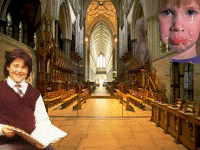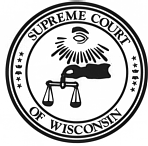 |

|
|
|
|
From PFAWF & AU Reports Comments by People for the American Way Foundation:
 Monday's announcement by the U.S. Supreme Court that it will not hear
Milwaukee parents' challenge to their state's use of public money for
religious schools leaves Wisconsin out of step with the nation, the
U.S. Constitution, and a previous landmark Supreme Court ruling. It
is likely to embolden voucher supporters who will exploit the
confusion the Court has created to step up pressure for similar
voucher legislation in other states. Monday's announcement by the U.S. Supreme Court that it will not hear
Milwaukee parents' challenge to their state's use of public money for
religious schools leaves Wisconsin out of step with the nation, the
U.S. Constitution, and a previous landmark Supreme Court ruling. It
is likely to embolden voucher supporters who will exploit the
confusion the Court has created to step up pressure for similar
voucher legislation in other states.
The Court's failure to take up the case, Jackson v. Benson, leaves in place the 1973 landmark ruling that outlawed reimbursing New York parents for religious school tuition, Committee for Public Education v. Nyquist, but fails to bring Wisconsin into line with that ruling. The result is to make Wisconsin a kind of extra-constitutional island where the Constitution doesn't mean the same thing as it does in the other 49 states. In June, the Wisconsin Supreme Court upheld the state's plan to expand its Milwaukee voucher program to include religious schools, putting it at odds with long-established U.S. Supreme Court precedent and with other rulings around the country. The Court's failure to hear the case only fuels the uncertainty over this issue. "Public education opponents will exploit the confusion to try to railroad through more voucher legislation, but legislators should be wary about climbing aboard the voucher train," said PFAWF President Carole Shields. "Voucher supporters will claim that the Wisconsin Supreme Court was right to uphold vouchers for religious schools, but they won't talk about the rulings in Ohio, Maine, Vermont, New Jersey, and Pennsylvania that have thrown out vouchers and other similar proposals." PFAWF Legal Director Elliot Mincberg cautioned legislators against buying the voucher supporters' interpretation of the Court's announcement. He noted that the Court has repeatedly stressed that a decision not to hear a case is not a ruling on the merits of the case. "Nyquist is still the law of the land and has not been overturned by the Court," Mincberg said. "Until and unless the Supreme Court changes its mind about Nyquist, it remains unconstitutional to use public money for religious school vouchers."
 People For the American Way Foundation is co-counsel representing
Milwaukee parents and citizens in the Wisconsin case and in late
August asked the Supreme Court to review the plan.
People For the American Way Foundation is co-counsel representing
Milwaukee parents and citizens in the Wisconsin case and in late
August asked the Supreme Court to review the plan.
PFAWF contends that the Wisconsin plan violates the Establishment Clause of the First Amendment by advancing religion with public tax dollars. In addition to PFAWF, other groups serving as co-counsel in the Wisconsin case are the NAACP, the Wisconsin Education Association Council, Wisconsin Federation of Teachers, American Civil Liberties Union and ACLU of Wisconsin Foundation, Americans United for Separation of Church and State and the National Education Association. PFAWF also contends that vouchers, in addition to violating the constitutional doctrine of separation of church and state, weaken public schools by diverting tax dollars that are needed for more teachers, updated texts and equipment, and other school improvements. This school year, for example, the Milwaukee Public Schools have lost over $20 million that is being paid out as vouchers. Most of that money is being used to pay tuition for students who were already in private schools before the expanded voucher plan took effect. PFAWF has won legal battles against vouchers in Pennsylvania and New Jersey, and at the state appeals court level in Ohio. A ruling is pending from the Ohio Supreme Court, which last month heard oral arguments in the appeal of the lower court ruling that struck down the Cleveland voucher plan, the nation's second largest such program. An appeal may be forthcoming in Pennsylvania. PFAWF also has organized parents and citizens who oppose vouchers, and has held pro-public education seminars and rallies in Baltimore, Chicago and Philadelphia, with another one planned for Milwaukee in December. Shields cited growing evidence that vouchers create far more problems than they solve. "Vouchers not only divert money from public schools that most children depend on for their education, they also create new problems because the schools they support do not have to meet the same standards and accountability as the public schools," Shields said. She noted that private and religious schools, unlike public schools, are not obligated to disclose to parents how their money is being spent, to report test scores and other measures of educational progress, or to grant students the civil rights and other protections that are required of the public schools. "Vouchers are an experiment that looks more and more likely to blow up in parents' and children's faces," Shields warned. Comments by Americans United for Separation of Church & State: The Supreme Court's decision not to review Wisconsin's school voucher program is disappointing but sets no nationwide precedent, according to Americans United for Separation of Church and State.
Americans United and a coalition of other groups sponsored the challenge to the "Milwaukee Parental Choice Program" and had asked the Supreme Court to overturn a Wisconsin Supreme Court decision upholding the program. "The Supreme Court's refusal to hear the case is disappointing but not that surprising," said AU's Lynn. "After all, the high court accepts less then 2 percent of all cases appealed to it." Legal cases dealing with school vouchers are pending in Ohio, Vermont, Pennsylvania and Maine. In addition, a religious school tax break scheme is pending before the state supreme court in Arizona. Lynn said one of those cases will undoubtedly give the court an opportunity to address this issue in the future. Lynn said Americans United remains convinced that vouchers are unconstitutional. He noted that state and federal courts have routinely rejected voucher aid to church schools. "Vouchers are nothing more than a tax to pay for religion," he said. "American taxpayers should never be forced to support religious instruction." |
 The Rev. Barry Lynn
The Rev. Barry Lynn 